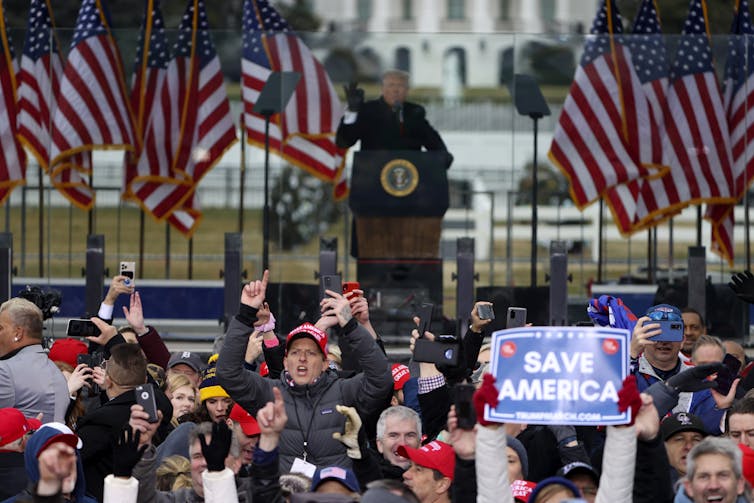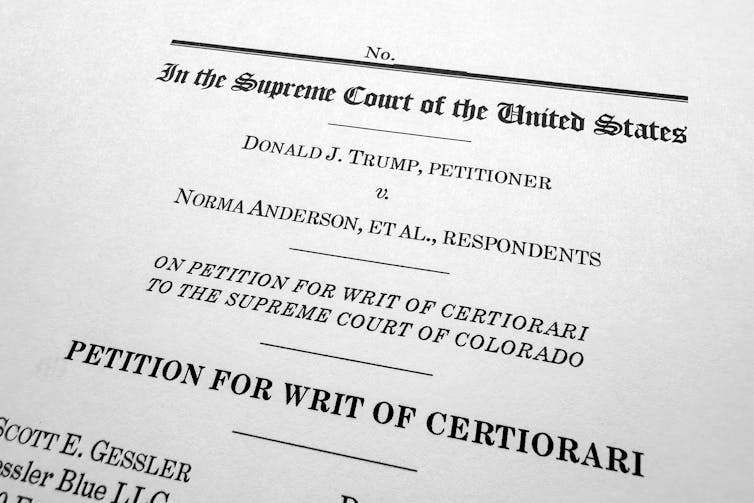[ad_1]
Submitting late within the day to satisfy the Jan. 18, 2024, deadline, former President Donald Trump submitted a quick to the U.S. Supreme Courtroom that requested the justices to overturn the Colorado Supreme Courtroom’s determination to take away him from that state’s major poll.
Norma Anderson, a Republican and former Colorado state lawmaker, and several other different plaintiffs had filed go well with in September 2023 to maintain Trump off the 2024 Colorado ballots. The plaintiffs argued that Trump was disqualified from public workplace as a result of his “efforts to overturn the 2020 election and intervene with the peaceable switch of energy have been a part of an rebel in opposition to the Structure of america.” Their arguments have been primarily based on Part 3 of the 14th Modification of the Structure, which bans insurrectionists from holding public workplace.
The Colorado Supreme Courtroom issued its ruling within the case, initially often called Anderson v. Griswold, on Dec. 19. The Colorado justices concluded that Trump was disqualified from holding the workplace of the president due to his actions on Jan. 6, 2021, and so they affirmed the trial court docket’s conclusion that Trump engaged in an rebel.
“These actions constituted overt, voluntary, and direct participation within the rebel,” the court docket majority wrote.
Trump faces greater than a dozen related authorized challenges to his candidacy in different states as properly, primarily based on Part 3. Many complainants, jurists and constitutional regulation students argue that Trump is disqualified to carry workplace as a result of he “engaged in rebel or rebel” in opposition to the U.S. primarily based on his actions earlier than, throughout and after the assault on the U.S. Capitol on Jan. 6, 2021.
Trump appealed the Colorado Supreme Courtroom’s determination to the U.S. Supreme Courtroom, and the justices agreed to contemplate the case. In his Jan. 18 temporary, Trump offered a spread of arguments for why the Colorado determination was improper. Chief amongst them: He claimed that Part 3 of the 14th Modification doesn’t apply to the presidency and that he didn’t have interaction in an rebel in opposition to america.
Describing his actions on Jan. 6, 2021, Trump’s temporary says “Calling for peace, patriotism, respect for regulation and order, and directing the Secretary of Protection to do what must be completed to guard the American folks is on no account inciting or collaborating in an ‘rebel.’”

Tasos Katopodis/Getty Photos
Officers and insurrections
Trump’s temporary assaults the Colorado Supreme Courtroom’s “doubtful interpretation of (S)ection 3 of the Fourteenth Modification.” He argues that Part 3 doesn’t apply to the presidency as a result of the “President isn’t an ‘officer of america.’” Trump factors to different components of the Structure that use the time period “Officer,” and he argues that an “Officer of america” solely consists of political appointees, such because the Secretary of State, and never anybody who’s elected to an workplace.
There may be benefit to this argument, however Trump confuses the unique intent of the Framers, when the Structure was initially ratified, with the intent of the thirty ninth Congress that drafted the 14th Modification a long time after the nation’s founding. A number of constitutional regulation students argue that the thirty ninth Congress did intend for Part 3 to use to the presidency as a result of congressional information spotlight senators’ and representatives’ particular feedback that it ought to.
Whether or not Part 3 applies to the presidency is probably going the primary query that the Supreme Courtroom must reply. Whereas Trump additionally claims that he didn’t have interaction in an rebel, the justices possible won’t take into account whether or not he did or not as a result of the court docket usually doesn’t disturb the factual conclusions of trial courts.
However the justices could have to contemplate the opposite authorized questions that Trump raises. Trump argues that even when Part 3 applies to the presidency, it can’t be enforced as a result of Congress has not handed a regulation to implement it. However as a constitutional regulation scholar, I consider that maybe his strongest argument and the justices’ best authorized query to reply turns to the plain textual content of Part 3, which states that it bars insurrectionists and rebels from holding workplace. It doesn’t say something about working for workplace.
Bullets, not ballots
The 14th Modification, ratified in 1868, is taken into account a “Reconstruction Modification,” together with the thirteenth and fifteenth amendments. Congress and state legislatures ratified the Reconstruction Amendments within the years instantly following the tip of the Civil Warfare. Inside that context, the drafters of the Reconstruction Amendments sought, amongst many issues, to forestall Confederates from serving in public workplace following their unsuccessful rebel in opposition to the Union.
Part 3 of the 14th Modification says:
“No individual shall be a Senator or Consultant in Congress, or elector of President and Vice-President, or maintain any workplace, civil or army, underneath america, or any State, who, having beforehand taken an oath, as a member of Congress, or as an officer of america, or as a member of any State legislature, or as an govt or judicial officer of any State, to assist the Structure of america, shall have engaged in rebel or rebel in opposition to the identical, or given assist or consolation to the enemies thereof. However Congress could by a vote of two-thirds of every Home, take away such incapacity.”
With 15 commas, the that means and utility of Part 3 could confuse many readers. Constitutional regulation scholar Mark Graber offered a radical dialogue of every sentence fragment and clause in a current article for The Dialog. In his abstract of this part of the 14th Modification, he says “These phrases within the modification declare that those that flip to bullets when ballots fail to offer their desired consequence can’t be trusted as democratic officers.”

AP Photograph/Jon Elswick
Settling the unsettled
The Supreme Courtroom agreed to contemplate Trump’s enchantment in early January 2024 as a result of whether or not Trump is constitutionally certified to function the president of america once more is a important query in an space of regulation that’s not settled. Whereas the Supreme Courtroom thought of some common instances of rebel and rebel following the Civil Warfare, the Supreme Courtroom has by no means confronted this particular query relating to Part 3.
The Supreme Courtroom will take into account whether or not the Colorado Supreme Courtroom erred in ordering the previous president excluded from the 2024 presidential major poll.
However this particular query additionally presents various associated authorized questions that the Supreme Courtroom may additionally determine, starting from whether or not Part 3 applies to the presidency as to if Part 3 solely prohibits a candidate from serving in workplace versus showing on any poll. Then, after all, there may be the factual concern as as to if the previous president “engaged in an rebel or rebel” in opposition to america.
The Supreme Courtroom will hear oral arguments in Trump v. Anderson on Feb. 8, 2024.
[ad_2]
Source link




